Related Research Articles
The classical unities, Aristotelian unities, or three unities represent a prescriptive theory of dramatic tragedy that was introduced in Italy in the 16th century and was influential for three centuries. The three unities are:
- unity of action: a tragedy should have one principal action.
- unity of time: the action in a tragedy should occur over a period of no more than 24 hours.
- unity of place: a tragedy should exist in a single physical location.

Victor-Marie Hugo was a French Romantic writer and politician. During a literary career that spanned more than sixty years, he wrote in a variety of genres and forms. He is considered to be one of the greatest French writers of all time.

Honoré de Balzac was a French novelist and playwright. The novel sequence La Comédie humaine, which presents a panorama of post-Napoleonic French life, is generally viewed as his magnum opus.
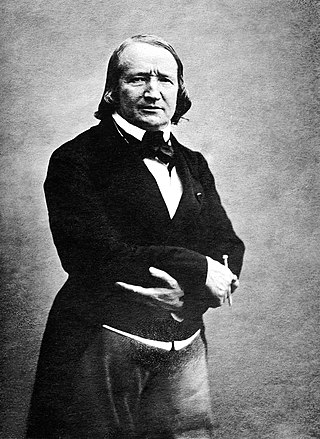
Alfred Victor, Comte de Vigny was a French poet and early French Romanticist. He also produced novels, plays, and translations of Shakespeare.

The Great Bible of 1539 was the first authorised edition of the Bible in English, authorised by King Henry VIII of England to be read aloud in the church services of the Church of England. The Great Bible was prepared by Myles Coverdale, working under commission of Thomas, Lord Cromwell, Secretary to Henry VIII and Vicar General. In 1538, Cromwell directed the clergy to provide "one book of the Bible of the largest volume in English, and the same set up in some convenient place within the said church that ye have care of, whereas your parishioners may most commodiously resort to the same and read it."

Charles Augustin Sainte-Beuve was a French literary critic.

Karl Georg Büchner was a German dramatist and writer of poetry and prose, considered part of the Young Germany movement. He was also a revolutionary and the brother of physician and philosopher Ludwig Büchner. His literary achievements, though few in number, are generally held in great esteem in Germany and it is widely believed that, had it not been for his early death, he might have joined such central German literary figures as Johann Wolfgang von Goethe and Friedrich Schiller at the summit of their profession.

François Ponsard was a French dramatist, poet and author and was a member of the Académie française.

The Last Day of a Condemned Man is a novella by Victor Hugo first published in 1829. It recounts the thoughts of a man condemned to die. Victor Hugo wrote this novel to express his feelings that the death penalty should be abolished.
William Shakespeare is an 1864 work by Victor Hugo, written in his 13th year of exile. The title is misleading; the true subject of the work is the writers that Hugo considered "the greatest geniuses of all time."
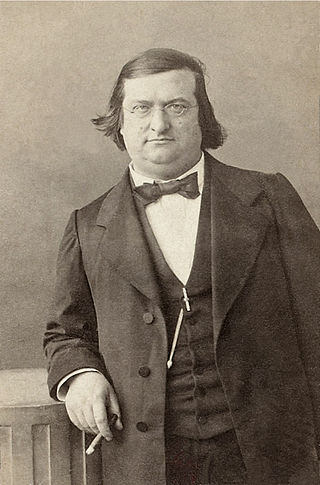
Louis Ulbach was a French novelist, essayist and journalist. He published seventy-six volumes, wrote three plays, and wrote numerous articles and political or biographical pamphlets. His romantic novels were compared to the works of Émile Zola and Alphonse Daudet.
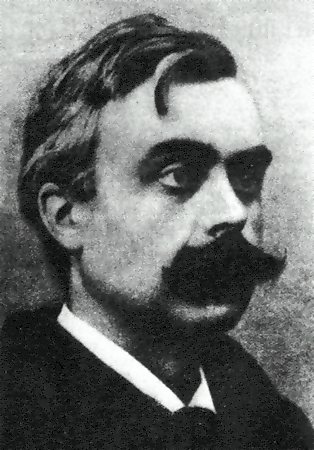
Léon Bloy was a French Catholic novelist, essayist, pamphleteer, and satirist, known additionally for his eventual defense of Catholicism and for his influence within French Catholic circles.

Les Burgraves is a historical play by Victor Hugo, first performed by the Comédie-Française on 7 March 1843. It takes place along the Rhine and features the return of Emperor Barbarossa. The play failed commercially and was the last of Hugo's plays to be produced in his lifetime. It was the subject of an orchestral overture by the composer Guillaume Lekeu in 1890.
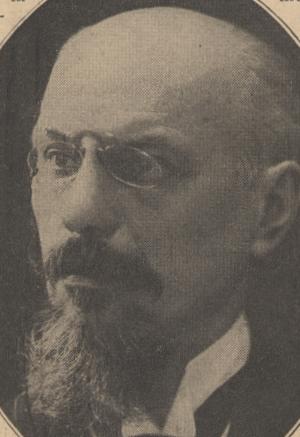
Émile Fabre was a French playwright and general administrator of the Comédie-Française from 1915 to

Paul Meurice was a French novelist and playwright best known for his friendship with Victor Hugo.

La Esmeralda is a grand opera in four acts composed by Louise Bertin. The libretto was written by Victor Hugo, who had adapted it from his 1831 novel Notre-Dame de Paris. The opera premiered at the Théâtre de l'Académie Royale de Musique in Paris on 14 November 1836 with Cornélie Falcon in the title role. Despite the lavish production, the premiere was a failure, and La Esmeralda proved to be the last opera composed by Bertin, although she lived for another 40 years.
Lycée Français de Sofia Victor Hugo is a French international school in the Maxi Complex in Vitosha, Sofia, Bulgaria.
Anne Beffort was a Luxembourg educator, literary writer and biographer. She is remembered for her works on Victor Hugo and Alexandre Soumet and for her support of French culture in Luxembourg.
For centuries Paris has been the home and frequently the subject matter of the most important novelists, poets, and playwrights in French literature, including Moliere, Voltaire, Balzac, Victor Hugo and Zola and Proust. Paris also was home to major expatriate writers from around the world, including Henry James, Ivan Turgenev, Oscar Wilde, Ernest Hemingway, James Joyce, Leopold Senghor, James Baldwin, Richard Wright, Milan Kundera and Henry Miller. Few of the writers of Paris were actually born in Paris; they were attracted to the city first because of its university, then because it was the center of the French publishing industry, home of the major French newspapers and journals, of its important literary salons, and the company of the other writers, poets, and artists.
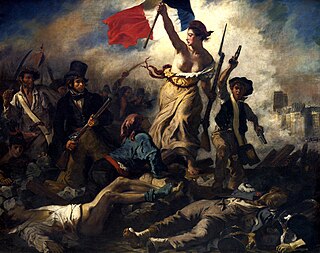
Romanticism was a literary and artistic movement that appeared in France in the late 18th century, largely in reaction against the formality and strict rules of the official style of neo-classicism. It reached its peak in the first part of the 19th century, in the writing of François-René de Chateaubriand and Victor Hugo, the poetry of Alfred de Vigny; the painting of Eugène Delacroix; the music of Hector Berlioz; and later in the architecture of Charles Garnier. It was gradually replaced beginning in the late 19th century by the movements of Art Nouveau, realism and modernism.
References
- ↑ Florence, Naugrette (13 June 2001). "Publier Cromwell et sa Préface : une provocation fondatrice" (PDF). Impossibles Théâtres (in French). Grenoble, France. p. 9. Retrieved 22 March 2015.
- ↑ Remshardt, Ralf (2004). Staging the Savage God: The Grotesque in Performance. Southern Illinois University. p. 74.
- ↑ Grundmann, Heike (2005). Ferber, Michael (ed.). A Companion to European Romanticism. Malden: Blackwell Publishing, Ltd. p. 41.
- ↑ Coulet du Gard, Rene (1976). "Victor Hugo's "Cromwell"". Literary Onomastics Studies. University of Delaware. 3: 94–101. Retrieved 3 January 2015.